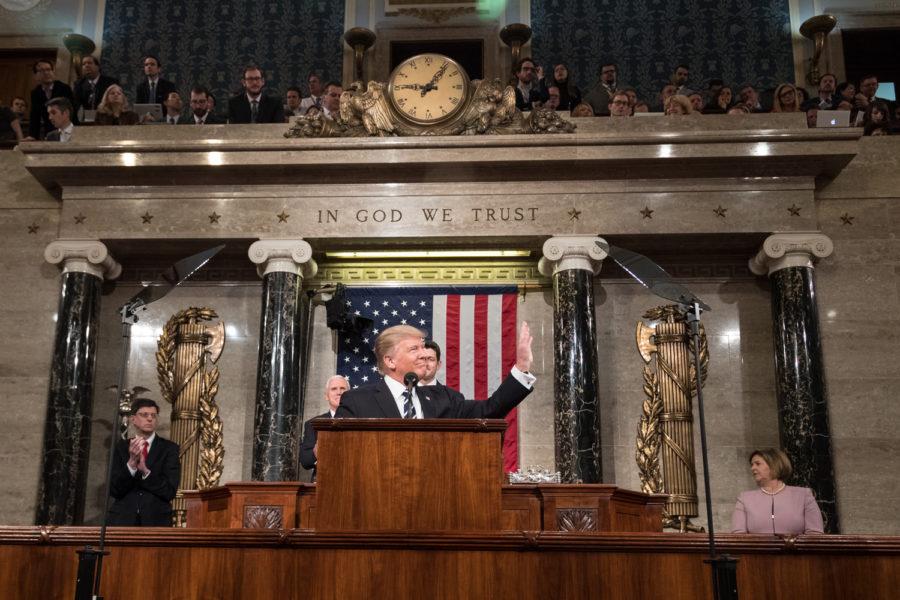Trump highlights two sides of the nation during State of the Union address
President Donald Trump delivers the Address to Congress on Tuesday, February 28, 2017, at the U.S. Capitol. This is the President’s first Address to Congress of his presidency.
February 6, 2019
President Donald Trump gave his long-awaited State of the Union address Tuesday in front of members of congress and the world, providing a platform for the president to highlight his hopes, accomplishments and agenda moving into his next two years.
At one of his lowest approval ratings during his presidency and having lost control of the House of Representatives after the midterm elections, Trump faced challenges to get to speak in front of congress; the speech was postponed pending the conclusion of a record-breaking government shutdown.
After ending the shutdown and scheduling the speech, Trump was able to stress multiple policy areas and points of contention:
Immigration
A major focal point of the address was about the ongoing debate over illegal immigration in the country.
“We have a moral duty to create an immigration system that protects the lives and jobs of our citizens,” President Trump said in regards to the importance of the issue. He cited border walls near San Diego and El Paso had turned high crime areas into safer ones. According to U.S. Customs and Border Protection data, the barrier did decrease illegal crossings in the sector by 75 percent. The sheriff of El Paso disagreed with the President and said that the city has always been safe.
“One in three women is sexually assaulted on the long journey north,” Trump said. Statistics are difficult to report on accurately because not every incident is brought to authorities, but sexual assault is known to be an issue in border crossings.
Immigration has been a divisive topic the past several weeks as a national debate has occurred between the president and Congress. The argument over a border wall was partly responsible for a recent government shutdown. Speaker of the House Nancy Pelosi said that throughout the shutdown she and her colleagues would not accept a budget with funding of a wall included. The issue hasn’t been resolved between both parties.
Abortion
When talking about the topic of abortion, President Trump brought a recent decision by the New York State Legislature to the forefront. The law would allow abortions to occur at any point in a pregnancy. The president responded, calling on Congress to pass legislation that would prohibit late-term abortions across the country.
“Let us work together to build a culture that cherishes innocent life,” Trump said.
Health Care
Several topics under the mantle of health care were discussed by the president, including the cost of health care, the HIV and AIDS situation, childhood cancer and paid family leave.
He proposed that several parts of the health care process should be more transparent.
“We should also require drug companies, insurance companies and hospitals to disclose real prices, foster competition and bring costs way down,” Trump said.
When speaking of HIV and AIDS, he said that the situation had become an epidemic but the country had made “remarkable progress.”
President Trump also invited a young girl who had been diagnosed with cancer to sit next to the first lady. He said that she was an inspiration to those in the room and then proposed a $500 million budget for cancer research.
The topic of health care concluded with the president saying that he was proud to be the first president to sponsor paid family leave.
Criminal Justice Reform
Changing the way the justice system works was one of the first issues discussed during President Trump’s speech.
“This legislation reformed sentencing laws that have wrongly and disproportionately harmed the African American community,” Trump said, citing bipartisan support for what is called the First Step Act.
Despite the bipartisan tone in parts of the speech, ISU assistant professor of political science David Andersen said he was confused by what the president said throughout the course of the speech.
“I think tonight’s State of the Union was weird,” Andersen said.
Andersen thought the speech had several conflicting tones at different points. At first, the president called for unity between parties to confront national issues, but as the speech progressed, divisive issues took priority.
Ashton Ayers, political director for ISU Democrats, agreed.
“I don’t think there’s anything more he can do to damage his brand,” Ayers said. “The president has proved he’s a bigot, he’s a racist and he’s a misogynist.”
He continued to say Democrats need to push a more progressive agenda in the future to advance their interests.
Ben Whittington, vice president of Politics at ISU, said conservatives would be happy with President Trump’s speech.
“I think he hit a lot of points that conservatives enjoy,” Whittington said.
Whittington said he was glad that immigration was a major topic of discussion even if he didn’t agree with every point.
“I just wish that moving forward, he works with Democrats to find a solution,” Whittington said.
Editors note: This article originally stated that Ben Whittington was the president of Iowa State’s chapter of Turning Point USA. While Whittington used to be the president of the club, this is no longer the case. Additionally Whittington claimed conservatives would be happy with the speech, not himself like the article originally stated. The Daily regrets these errors.
















